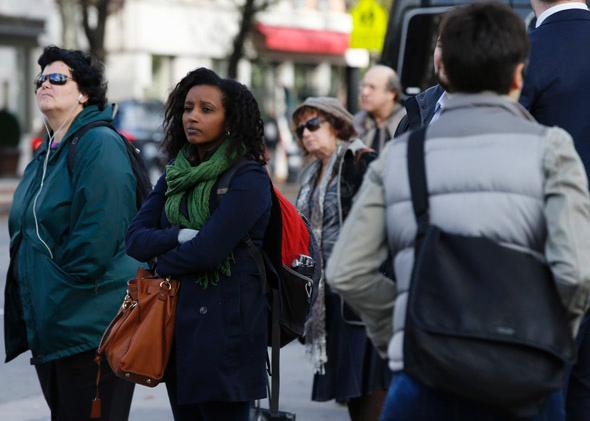The interviews for the Whiteness Project—a new series from PBS and documentary filmmaker Whitney Dow—are varied, succinct, and candid. “Because slavery happened, does that mean we owe black people something?” asks one participant, who continues with other, similar observations. “I think it’s hard to talk about race as a white person because, maybe, black people are just looking for a reason to tell you why you’re wrong, or tell you why you owe them something,” he said. “I just don’t buy into that nonsense about discrimination,” says a doctor. He insists: “If you have it upstairs, and you really commit to doing what you want to do with your life, I don’t think race has anything to do with anything.”
These interviews are just the first part in a larger series, and already, they’re valuable. It’s rare that white Americans talk about race. It’s even rarer that they do so on camera. And it’s rarer still that they reveal ignorance, confess to prejudices, and share their fears.
With that said, watching the interviews is jarring. In general, you don’t expect anyone to openly say he or she is “proud to be white” or warn that “a lot of white boys aren’t going to be pushed around.” But although these interviews are often unpleasant, they’re also useful, since they illustrate the extent to which blacks and whites really do inhabit vastly different worlds.
Take social circles and relationships. According to a recent survey from the Public Religion Research Institute, 75 percent of white Americans have entirely white social networks “without any minority presence.” Per the interviews, it’s not just that people are unfamiliar with race, it’s that—in all likelihood—they don’t know many minorities, which leads to myths and misconceptions about their behavior and status.
You see this in various survey data. Median income among black Americans is roughly half that of white Americans. But a narrow majority of whites believe blacks earn as much money as whites, and just 37 percent believe that there’s a disparity between the two groups. Likewise, while 56 percent of blacks believe black Americans face significant discrimination—as evidenced by recent statistics on police shooting—only 16 percent of whites agree. The most striking result is the degree to which many whites—including many millennials—believe discrimination against whites is more prevalent than discrimination against blacks.
I’ve written a lot about the black/white divide on a variety of issues, from the Michael Brown shooting in Ferguson, Missouri, to differing views of government and the social safety net. Not only does this data underscore the vast gap in perception, but it suggests a solution—blacks and whites (and Latinos and Asians and others) need to share the same space if we’re going to have any empathy or understanding.
But life isn’t an ABC after-school special, and fixing the problem of segregation isn’t as easy as a plea to get along. Yes, the United States is more integrated than it’s ever been, but it’s still incredibly segregated with huge barriers to further progress, from exclusionary zoning and housing discrimination to concentrated poverty and hiring bias, and broader trends of resegregation in school systems and neighborhoods across the country.
Sadly, at the same time we need to push harder for an integrated society, we have a mainstream political movement devoted to gutting our key tools for fighting bias, and indulging many white Americans in their misguided belief that we live in a racially equal society.
